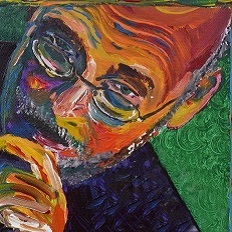The ward of Damocles
Our narrator encounters Dr. Cicero and Dr. Dan O’Klees.
I was sitting in the doctors' lounge, contemplating a newly available leadership position. I was happy to see the ever-affable and kind Dr. Cicero enter, in search of the pleasure of a well-earned donut. I asked him whether he was applying for the job, and he responded with a virtuous smile and this parable.

In the ancient city of S, many years ago, there lived a second-generation physician named Dr. Alphonso Dionysius II. He was known as Dr. D2, but not affectionately. Sadly, warmth was not a term ever applied to him. He was not beloved, but in fact reviled, abhorred, and disliked by most of his colleagues. His father had been chairman of internal medicine, and Dr. D2 had plotted his own pugnacious rise to power from his days in medical school. Now he was the first professor and chair of hospital medicine. He ruled with an iron fist covered by the thinnest of velvet gloves. How he became chair of the division was a mystery to outsiders, but anyone who became a barrier to the fruition of his ambitions knew the devious tricks, innuendo, funding maneuvers, and general Machiavellian malfeasance that had gotten him where he was. But despite all this, his services ran smoothly and patients received the best of care.
Another physician on the staff was Dr. Dan O’Klees. He had heard many jokes about his name and its similarity to Damocles, who was temporarily made king but had a sword suspended over his head by a horse's hair in the event he made an error. Colleagues also jokingly asked if he had a gunslinging sister named Annie O’Klees. Whatever the jest, he brought out his subservient smile and obsequious chuckle to make the person think they were hilarious, though he really felt they were annoying. And he added them to his payback list.
Though he would rather be treated with more formality, he tolerated being called Dr. OK, not realizing that it was a sarcastic sobriquet based on his reputation as a “yes man.” Dr. OK was by far the most sycophantic and servile doctor you would ever be likely to meet. However, the patients all loved him, since he seemed to be making time for them (even though the time was commensurate with the payer class). He didn't care much for clinical work and dreamed of one day being in charge. He was quick to take credit for successes and even quicker to assign blame for failures. Office gossip was his stock in trade. Many who knew him considered him a bitter, backstabbing weasel.
Dr. D2 had no misconceptions about his junior colleague. Dr. OK was a rumor mill and an overflattering toady who would be sure to second any motion or give words of support to a strategic project that Dr. D2 proposed in committee. But Dr. D2 also knew that Dr. OK had dreams of replacing him as chief. A plan was forming in his mind.
Dr. D2 invited Dr. OK into the C-suite. Dr. OK sat on the unfamiliar and overstuffed couch and sipped a latte from a ceramic mug emblazoned with the hospital's logo. Now this was the luxury that was missing from his life. He thought to himself that this was where he belonged. Dr. D2 looked the younger man in the eyes, laid his hand on his shoulder, and told him he'd been watching his progress. He added that he knew Dr. OK had great ideas for running the hospital. Dr. OK tried to deny it, but his efforts were half-hearted. That's when Dr. D2 broke the news.
He explained that he was urgently needed on family business, and he would be out of pocket for a week or two, outside of cell phone range. He would be leaving Dr. OK in complete charge of the wards till he returned. Would he do it? Dr. OK leaped at the chance, immediately agreeing to the plan, asking as an aside if he could have the key card to the suite and use of Dr. D2's parking spot. Both would be fine, Dr. D2 said. Dr. OK was effusive in his thanks. He couldn't wait to post his new, if temporary, title on his social media accounts (though the likes he got were generally few and far between).
Dr. D2 smiled to himself as he left that afternoon, armed with insider knowledge and a clear view of his colleague's character. Dr. OK was already on the wards giving commands and orders and making sure everyone knew exactly who wore the crown. As Dr. D2 headed out of town, he made a quick call to Dr. OK. He wished him well and, as if as an afterthought, said to his younger colleague, “Oh, I forgot to mention, the Joint Commission will be making a visit next week. Good luck.”
I stared at Dr. Cicero and pondered the message he had given me. After mulling it over, I submitted my application for the administrator position. After all, my chances were much better without Dr. Cicero in the running.



